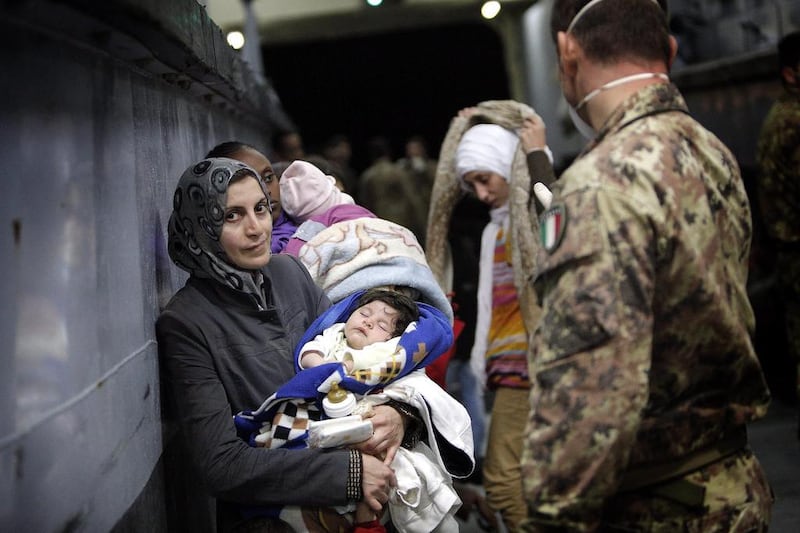BRUSSELS // European Union leaders pledged to act yesterday to stop even more boat-people drowning in the Mediterranean, weeks after 400 refugees fleeing conflict in Africa and Syria perished in dramas that shocked the continent.
“The EU cannot accept that thousands of people die at our borders,” José Manuel Barroso, who heads the European Commission, the EU’s executive, said at the close of a two-day summit.
“The scale of the tragedy in the Mediterranean means we have to act now.”
Expressing “deep sadness” over the recent deaths just as Italy reported 700 more boat-people were plucked to safety overnight off Sicily in six rescue operations, EU leaders agreed on three principles: prevention, protection and solidarity.
Enrico Letta, the Italian prime minister, welcomed the pledge of “solidarity” as a new step in efforts to craft a common migration policy and take joint action on the pressing but politically sensitive issue of migration flows.
A proposed EU action plan as well as a rethink on broad migration and refugee issues were pushed back however to EU summit meetings in December and June 2014, a final summit statement said.
Countries on the bloc’s crisis-hit southern fringe – Cyprus, Greece, Italy, Malta, Spain, and Croatia on the EU’s Balkans frontier – complain they cannot cope with the boatloads of would-be migrants and have pleaded for help from wealthier countries in northern Europe.
But as anti-immigrant parties pick up support across the crisis-hit bloc, how to accommodate more foreigners while unemployment nudges record highs remains politically explosive.
Northern nations moreover claim to be sharing the burden already, with the lion’s share of refugees ultimately finding shelter in Belgium, Britain, France, Germany and Sweden, who take in 70 per cent of those fleeing conflict.
As conflict in Syria continues unrelentingly, Europe fears further migratory pressure on its external borders.
Italy says migrant numbers increased four-fold this year to 30,000, Spain says twice as many Africans, 3,000, have tried to slip through its barbed-wire exclave of Melilla in Morocco this year, and Bulgaria reports seven times as many people trying to cross its border illegally in 2013.
Stopping would-be migrants and asylum-seekers from perishing at sea is difficult for the EU as such as it has no ships, planes or surveillance of its own.
At the summit, EU leaders agreed to provide fresh means and funding to the EU’s Frontex border agency and to swiftly implement a new programme to share satellite and drone surveillance data, Eurosur, to detect small vessels in trouble.
Frontex reportedly saved 16,000 people in the Mediterranean in the past two years but because of belt-tightening has seen its budget fall from €118 million (Dh600m) in 2011 to €85m this year.
The summit also pledged tougher action against human trafficking and aid and cooperation with countries of origin and transit to stem the flows.
“Europe can neither save nor welcome the whole world,” the president of the European Parliament, Martin Schulz, said.
“But we are the world’s richest continent and so must do more, specially if we act together, seek solutions together, and together take responsibility.”
Unless Europe’s approach to asylum and immigration changes, it won’t only be the migrants but the EU that drowns off Lampedusa,” said Giusi Nicolini, the mayor of the Italian island whose population of 6,000 has seen 13,000 people wash up on its shore this year.
Immigration charities estimate between 17,000 and 20,000 migrants have died at sea trying to reach Europe over the past 20 years, turning the Mediterranean into “a graveyard”, Mr Schulz said,
“Far too many people are dying every year at the EU’s external borders,” said Yves Pascouau of the European Policy Centre think tank. “EU leaders cannot escape answering the remaining questions any longer.”
On October 3, 366 refugees from Eritrea and Somalia died off Lampedusa when their boat caught fire and capsized.
On October 12, a boat carrying families fleeing war in Syria sank off Malta, killing at least 36.
* Agence France-Presse





